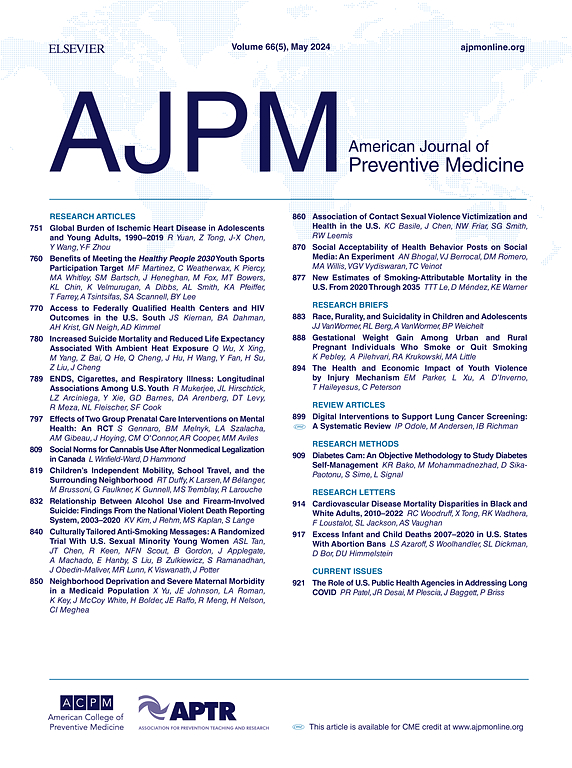进入幼儿园时的父亲抑郁和9岁时教师报告的行为。
IF 4.3
2区 医学
Q1 MEDICINE, GENERAL & INTERNAL
引用次数: 0
摘要
本研究调查了儿童5岁时父亲抑郁与9岁时教师报告的行为问题之间的关系。方法:在美国的一项队列研究中,研究了1422名儿童,其中大部分是非婚生的。目前正在进行的数据收集工作始于1998-2000年。2009-2010年,当孩子们进入中学时,行为结果被测量。分析在2023-2024年进行。估计父亲抑郁与儿童行为和社交技能得分之间的负二项回归模型和父亲抑郁与高(高于平均值≥1个标准差(SD))或低(低于平均值≥1个标准差)得分之间的logistic回归模型。结果:调整子女/父亲/家庭特征和母亲抑郁后,父亲抑郁与对立得分升高36%相关(IRR 1.36;95% CI: 1.02-1.82),多动评分高37% (IRR: 1.37;95% CI: 1.11-1.69)和ADHD评分高25% (IRR: 1.25;95% CI: 1.08-1.46),但与认知问题/注意力不集中评分无关。对于行为问题得分较高的人来说,类似的模式也很明显,aor在1.78-1.85之间。父亲抑郁与积极社交技能得分低11%和问题行为得分高25%有关,在各个子量表上都有类似的关联。类似的模式在一些高问题和低积极的社会技能中也很明显。结论:当孩子进入幼儿园时,父亲抑郁与教师在9岁时对孩子行为和社交技能的评分较低有关。这些发现表明,有必要采取干预措施,识别并支持有抑郁症状的父亲及其子女。本文章由计算机程序翻译,如有差异,请以英文原文为准。
Paternal Depression at Kindergarten Entry and Teacher-Reported Behavior at Age 9 Years
Introduction
This study investigated associations between paternal depression when children were age 5 years and teacher-reported behavioral problems at age 9 years.
Methods
1,422 children in a U.S. cohort study of mostly nonmarital births were studied. Data collection, which is ongoing, began in 1998–2000. Behavioral outcomes were measured in 2009–2010, when the children transitioned to middle school. Analysis was conducted in 2023–2024. Negative binomial regression models of associations between paternal depression and children's behavior and social skill scores and logistic regression models of associations between paternal depression and high (≥1 sSD above mean) or low (≥1 SD below mean) scores were estimated.
Results
Adjusting for child/paternal/family characteristics and maternal depression, paternal depression was associated with a 36% higher oppositional score (IRR=1.36; 95% CI=1.02, 1.82), 37% higher hyperactive score (IRR=1.37; 95% CI=1.11, 1.69) and 25% higher ADHD score (IRR=1.25; 95% CI=1.08, 1.46) but not associated with cognitive problem/inattention score. A similar pattern was apparent for high behavior problem scores, with AORs from 1.78 to 1.85. Paternal depression was associated with an 11% lower positive social skills score and a 25% higher problematic behavior score with similar associations across subscales. Similar patterns were apparent for some high problematic and low positive social skills.
Conclusions
Paternal depression when children transitioned to kindergarten was associated with poorer teacher ratings of behaviors and social skills at age 9 years. These findings suggest a need for interventions that identify and support fathers with depressive symptoms and their children.
求助全文
通过发布文献求助,成功后即可免费获取论文全文。
去求助
来源期刊

American Journal of Preventive Medicine
医学-公共卫生、环境卫生与职业卫生
CiteScore
8.60
自引率
1.80%
发文量
395
审稿时长
32 days
期刊介绍:
The American Journal of Preventive Medicine is the official journal of the American College of Preventive Medicine and the Association for Prevention Teaching and Research. It publishes articles in the areas of prevention research, teaching, practice and policy. Original research is published on interventions aimed at the prevention of chronic and acute disease and the promotion of individual and community health.
Of particular emphasis are papers that address the primary and secondary prevention of important clinical, behavioral and public health issues such as injury and violence, infectious disease, women''s health, smoking, sedentary behaviors and physical activity, nutrition, diabetes, obesity, and substance use disorders. Papers also address educational initiatives aimed at improving the ability of health professionals to provide effective clinical prevention and public health services. Papers on health services research pertinent to prevention and public health are also published. The journal also publishes official policy statements from the two co-sponsoring organizations, review articles, media reviews, and editorials. Finally, the journal periodically publishes supplements and special theme issues devoted to areas of current interest to the prevention community.
 求助内容:
求助内容: 应助结果提醒方式:
应助结果提醒方式:


